ResearchintranslationoflegalEnglish(法律英语的翻译浅析)
- 格式:docx
- 大小:19.23 KB
- 文档页数:4
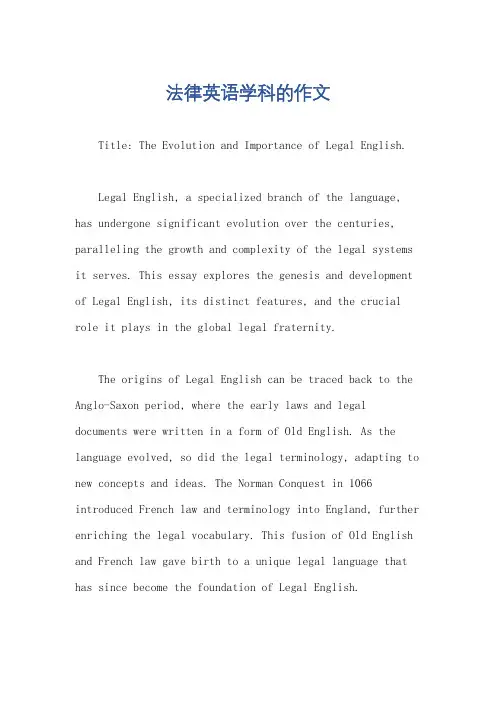
法律英语学科的作文Title: The Evolution and Importance of Legal English.Legal English, a specialized branch of the language, has undergone significant evolution over the centuries, paralleling the growth and complexity of the legal systems it serves. This essay explores the genesis and development of Legal English, its distinct features, and the crucial role it plays in the global legal fraternity.The origins of Legal English can be traced back to the Anglo-Saxon period, where the early laws and legal documents were written in a form of Old English. As the language evolved, so did the legal terminology, adapting to new concepts and ideas. The Norman Conquest in 1066 introduced French law and terminology into England, further enriching the legal vocabulary. This fusion of Old English and French law gave birth to a unique legal language that has since become the foundation of Legal English.One of the most distinct features of Legal English is its precision and clarity. Legal documents, such as contracts, statutes, and court judgments, must be written in a way that leaves no room for ambiguity or misinterpretation. The language used is often technical and specialized, with words and phrases having specific legal meanings that may differ from their common usage. For instance, the word "offer" in common parlance refers to a proposal or suggestion, but in legal terms, it has a specific meaning and legal consequences.Another noteworthy aspect of Legal English is its global influence. English, being the lingua franca of international law and business, has made Legal English a critical component of legal communication worldwide. Lawyers, judges, and legal scholars from diverse cultures and backgrounds use Legal English to communicate, collaborate, and argue legal cases. This common language of law has facilitated the harmonization of legal systems and the development of transnational legal norms.The importance of Legal English cannot be overstated.It is not just a language of legal professionals; it is a tool for justice, fairness, and equality. It ensures that legal rights and obligations are clearly defined and enforceable, safeguarding the interests of individuals and communities. Legal English also plays a pivotal role in international law, facilitating the resolution of disputes between nations and promoting global legal harmonization.In conclusion, Legal English is a unique and evolving language that has played a crucial role in shaping the legal systems of the world. Its precision, clarity, and global influence have made it an essential component of legal communication and justice delivery. As the world becomes increasingly interconnected, the importance of Legal English will continue to grow, promoting fairness, equality, and legal certainty across borders.。
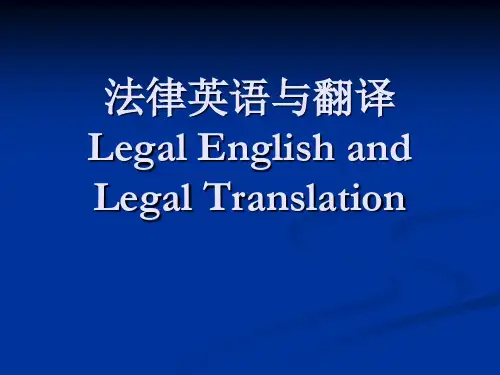
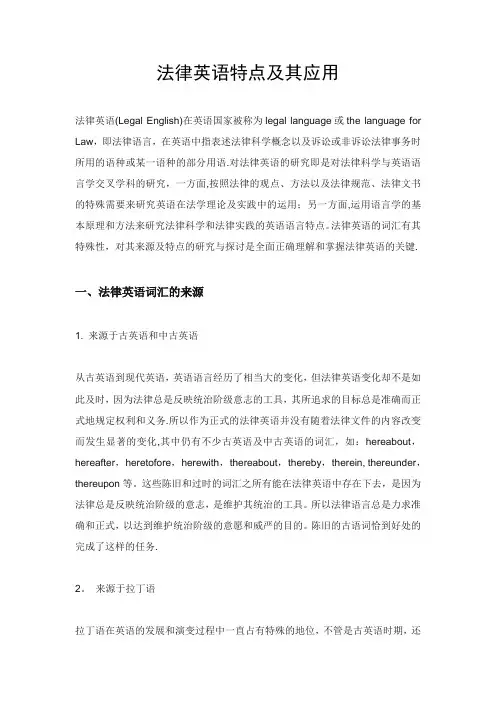
法律英语特点及其应用法律英语(Legal English)在英语国家被称为legal language或the language for Law,即法律语言,在英语中指表述法律科学概念以及诉讼或非诉讼法律事务时所用的语种或某一语种的部分用语.对法律英语的研究即是对法律科学与英语语言学交叉学科的研究,一方面,按照法律的观点、方法以及法律规范、法律文书的特殊需要来研究英语在法学理论及实践中的运用;另一方面,运用语言学的基本原理和方法来研究法律科学和法律实践的英语语言特点。
法律英语的词汇有其特殊性,对其来源及特点的研究与探讨是全面正确理解和掌握法律英语的关键.一、法律英语词汇的来源1. 来源于古英语和中古英语从古英语到现代英语,英语语言经历了相当大的变化,但法律英语变化却不是如此及时,因为法律总是反映统治阶级意志的工具,其所追求的目标总是准确而正式地规定权利和义务.所以作为正式的法律英语并没有随着法律文件的内容改变而发生显著的变化,其中仍有不少古英语及中古英语的词汇,如:hereabout,hereafter,heretofore,herewith,thereabout,thereby,therein, thereunder,thereupon等。
这些陈旧和过时的词汇之所有能在法律英语中存在下去,是因为法律总是反映统治阶级的意志,是维护其统治的工具。
所以法律语言总是力求准确和正式,以达到维护统治阶级的意愿和威严的目的。
陈旧的古语词恰到好处的完成了这样的任务.2。
来源于拉丁语拉丁语在英语的发展和演变过程中一直占有特殊的地位,不管是古英语时期,还是中古英语时期,拉丁语都是法律英语中的重要部分。
学习英语的人都应对拉丁语有所了解,更不用说法律工作者。
否则大量的拉丁语词汇将会使阅读和理解法律文献举步维艰。
如:ad damunm(就损害而言),amicus curiae(法官的顾问),corpus delicti(犯罪事实),de bonis non(已故遗产管理人的后继人),lex fori (法院地位)等.拉丁语的使用,维持着法律英语的正式特点。
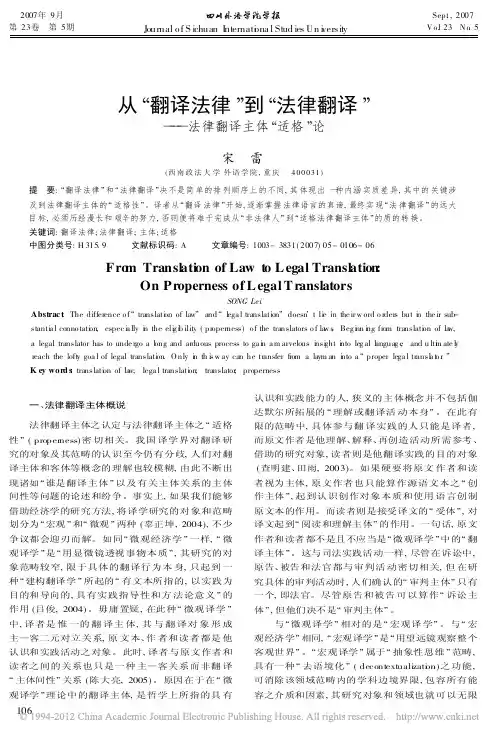
2007年9月第23卷第5期Journal o f S ichuan I nternati o na l Stud ies Un i v ersitySept.,2007V o.l23N o.5从/翻译法律0到/法律翻译0)))法律翻译主体/适格0论宋雷(西南政法大学外语学院,重庆400031)提要:/翻译法律0和/法律翻译0决不是简单的排列顺序上的不同,其体现出一种内涵实质差异,其中的关键涉及到法律翻译主体的/适格性0。
译者从/翻译法律0开始,逐渐掌握法律语言的真谛,最终实现/法律翻译0的远大目标,必须历经漫长和艰辛的努力,否则便将难于完成从/非法律人0到/适格法律翻译主体0的质的转换。
关键词:翻译法律;法律翻译;主体;适格中图分类号:H31519文献标识码:A文章编号:1003-3831(2007)05-0106-06Fro m Transl ati on of Law to L egal Transl ation:On Properness of L egal T ranslatorsSONG LeiAbstrac t:The difference o f/translati on of law0and/l ega l translation0doesn.t li e in the ir w ord o rders but i n the ir sub-stanti a l conno tati on,espec i a lly i n the eli g i b ility(properness)o f the translators o f la w s.Beg i nn i ng from translati on of la w, a legal translator has to unde rgo a l ong and arduous process to ga i n a m arvelous i nsi ght i nto leg al l anguag e,and u lti m ate l y reach the loft y goa l of legal translati on.O nly i n th i s w ay can he transfer from a laym an i nto a/proper lega l transl a t o r.0 K ey word s:translati on of la w;lega l translati on;translator;properness一、法律翻译主体概说法律翻译主体之认定与法律翻译主体之/适格性0(proper ness)密切相关。

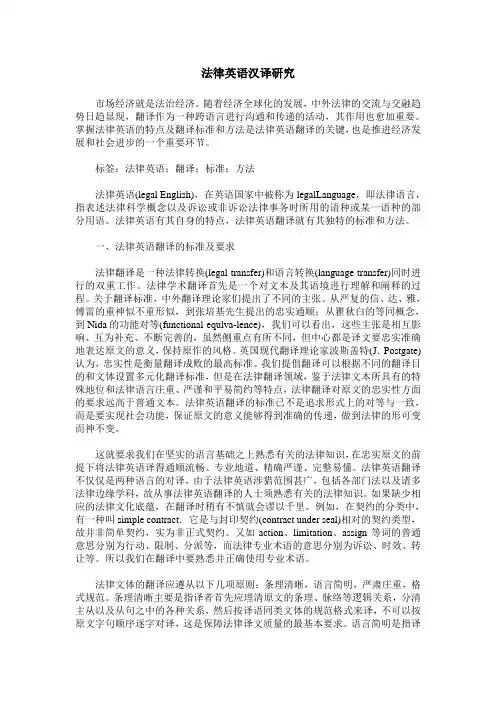
法律英语汉译研究市场经济就是法治经济。
随着经济全球化的发展,中外法律的交流与交融趋势日趋显现,翻译作为一种跨语言进行沟通和传递的活动,其作用也愈加重要。
掌握法律英语的特点及翻译标准和方法是法律英语翻译的关键,也是推进经济发展和社会进步的一个重要环节。
标签:法律英语;翻译;标准;方法法律英语(legal English),在英语国家中被称为legalLanguage,即法律语言,指表述法律科学概念以及诉讼或非诉讼法律事务时所用的语种或某一语种的部分用语。
法律英语有其自身的特点,法律英语翻译就有其独特的标准和方法。
一、法律英语翻译的标准及要求法律翻译是一种法律转换(legal transfer)和语言转换(language transfer)同时进行的双重工作。
法律学术翻译首先是一个对文本及其语境进行理解和阐释的过程。
关于翻译标准,中外翻译理论家们提出了不同的主张。
从严复的信、达、雅,傅雷的重神似不重形似,到张培基先生提出的忠实通顺;从瞿秋白的等同概念,到Nida的功能对等(functional equlva-lence),我们可以看出,这些主张是相互影响、互为补充、不断完善的,虽然侧重点有所不同,但中心都是译文要忠实准确地表达原文的意义,保持原作的风格。
英国现代翻译理论家波斯盖特(J.Postgate)认为,忠实性是衡量翻译成败的最高标准。
我们提倡翻译可以根据不同的翻译目的和文体设置多元化翻译标准,但是在法律翻译领域,鉴于法律文本所具有的特殊地位和法律语言庄重、严谨和平易简约等特点,法律翻译对原文的忠实性方面的要求远高于普通文本。
法律英语翻译的标准已不是追求形式上的对等与一致,而是要实现社会功能,保证原文的意义能够得到准确的传递,做到法律的形可变而神不变。
这就要求我们在坚实的语言基础之上熟悉有关的法律知识,在忠实原文的前提下将法律英语译得通顺流畅、专业地道、精确严谨、完整易懂。
法律英语翻译不仅仅是两种语言的对译,由于法律英语涉猎范围甚广,包括各部门法以及诸多法律边缘学科,故从事法律英语翻译的人士须熟悉有关的法律知识。
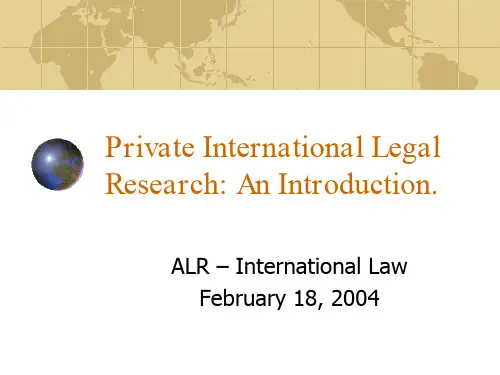
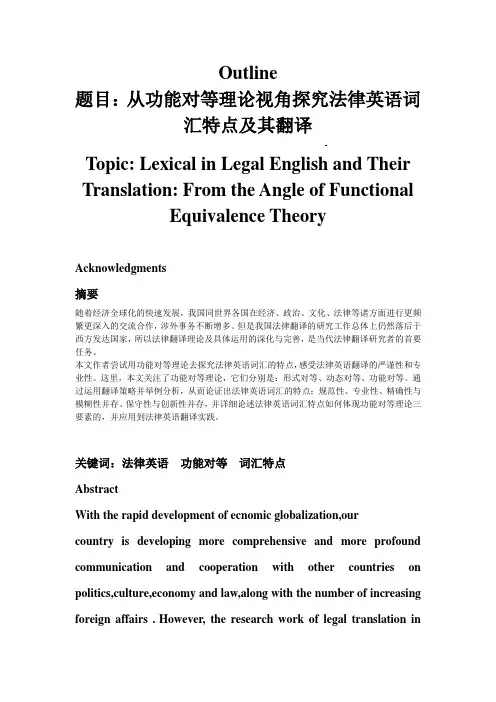
Outline题目:从功能对等理论视角探究法律英语词汇特点及其翻译-Topic: Lexical in Legal English and Their Translation: From the Angle of FunctionalEquivalence TheoryAcknowledgments摘要随着经济全球化的快速发展,我国同世界各国在经济、政治、文化、法律等诸方面进行更频繁更深入的交流合作,涉外事务不断增多。
但是我国法律翻译的研究工作总体上仍然落后于西方发达国家,所以法律翻译理论及具体运用的深化与完善,是当代法律翻译研究者的首要任务。
本文作者尝试用功能对等理论去探究法律英语词汇的特点,感受法律英语翻译的严谨性和专业性。
这里,本文关注了功能对等理论,它们分别是:形式对等、动态对等、功能对等。
通过运用翻译策略并举例分析,从而论证出法律英语词汇的特点:规范性、专业性、精确性与模糊性并存、保守性与创新性并存,并详细论述法律英语词汇特点如何体现功能对等理论三要素的,并应用到法律英语翻译实践。
关键词:法律英语功能对等词汇特点AbstractWith the rapid development of ecnomic globalization,ourcountry is developing more comprehensive and more profound communication and cooperation with other countries on politics,culture,economy and law,along with the number of increasing foreign affairs .However, the research work of legal translation inour country still lags behind the western developed countries. Therefore, the deepening and perfection of legal translation theory and concrete application is the primary task of contemporary legal translation researchers.The author tries to understand the lexcial characteristics of legal English by functional equivalence theory,to feel the precision and professionalism of legal English translation.Here, this article focuses on the three elements of functional equivalence theory, namely: formal equivalence, dynamic equivalence, functional equivalence.By using the translation strategies and analyzing the examples to conclude the characteristics of legal English vocabulary: normative, professional, precise and vague coexistence, conservative and innovative coexistence.Moreover, elaborating how the characteristics of legal English vocabulary reflect the three elements of functional equivalence theory, so as set an example and evidece for legal English translation practice.Keywords: legal English functional equivalence lexical feature 引言部分介绍了法律英语的研究现状,将要研究的问题以及研究此课题的意义等背景知识;第一章文献综述介绍了奈达的功能对等理论和内容,以及法律英语的定义、地位、特点;第二章是本文重点论述的部分,从四个方面举例论证法律英语词汇特点,并详细论述法律英语词汇特点如何体现功能对等理论的,并应用到法律英语翻译实践;第三章为总结部分,对于如何在法律英语翻译中实现功能对等进行了概括和总结,并指出掌握法律英语翻译技巧的重要性。
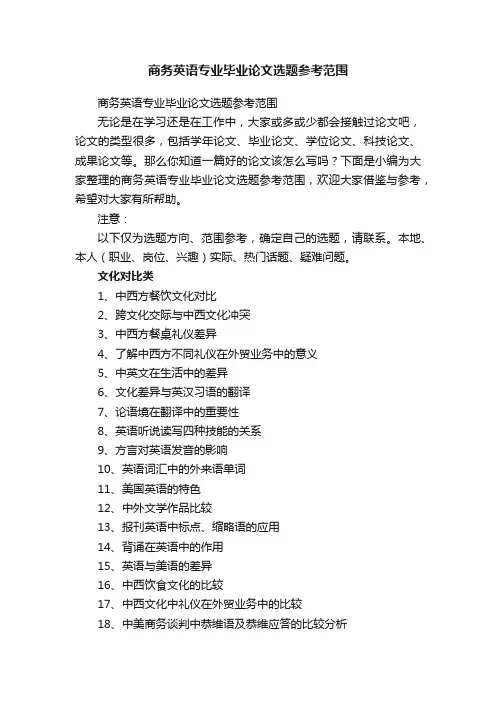
商务英语专业毕业论文选题参考范围商务英语专业毕业论文选题参考范围无论是在学习还是在工作中,大家或多或少都会接触过论文吧,论文的类型很多,包括学年论文、毕业论文、学位论文、科技论文、成果论文等。
那么你知道一篇好的论文该怎么写吗?下面是小编为大家整理的商务英语专业毕业论文选题参考范围,欢迎大家借鉴与参考,希望对大家有所帮助。
注意:以下仅为选题方向、范围参考,确定自己的选题,请联系。
本地、本人(职业、岗位、兴趣)实际、热门话题、疑难问题。
文化对比类1、中西方餐饮文化对比2、跨文化交际与中西文化冲突3、中西方餐桌礼仪差异4、了解中西方不同礼仪在外贸业务中的意义5、中英文在生活中的差异6、文化差异与英汉习语的翻译7、论语境在翻译中的重要性8、英语听说读写四种技能的关系9、方言对英语发音的影响10、英语词汇中的外来语单词11、美国英语的特色12、中外文学作品比较13、报刊英语中标点、缩略语的应用14、背诵在英语中的作用15、英语与美语的差异16、中西饮食文化的比较17、中西文化中礼仪在外贸业务中的比较18、中美商务谈判中恭维语及恭维应答的比较分析19、商务英语信函中词汇特征的分析其他1、礼仪在商务英语谈判中的作用2、商务英语函电在对外贸易中的作用3、商务合同中英语词汇的作用4、商务英语在中国加入 WTO 后的新发展和新趋势5、商务英语函电写作和作用6、商务谈判的成功因素7、中美商务谈判中恭维语及恭维应答的比较分析8、商务英语信函的词汇特征分析9、英汉习语中的明喻、暗喻和借代10、英汉习语对比及反映的东西方文化异同11、英语商标的文化内涵与汉译12、商务谈判中英语的重要性13、礼仪在商务谈判中的重要性14、还盘信中的写作技巧15、商务谈判中成功的要素16、商务函电的写作及用词特点17、入世商务英语写作的措施研究18、外贸单证在出口业务中的地位和作用19、对背信用证和可转让信用证的对比分析20、外贸单证在缮制过程中的要点毕业论文选题参考(1)以下为论文选题范围参考:1)外贸及其相关领域;2)商务英语语言研究与商务英语教学研究;3)商务英语翻译研究;4)市场营销研究;5)国际商务交际研究(2)以下为商务英语专业的参考选题,仅供参考:1) The Influence of Cultural Elements on the Translation of the idioms in Commercial English 试论文化因素对经贸领域中习语翻译的影响2) Commercial English: its characteristics and translation 经贸英语的特点与翻译3)The Characteristics of Business Contract Wording in English &; its Translation 英语经贸契约的用词特点与翻译4)On the Usage and Translation of Prepositions and Prepositional Phrases in Business Contracts in English 英语经贸契约介词和介词短语的用法及翻译5)Understanding and Translation of the Divisional Phenomena in English Economic Contracts 英语经贸契约分隔现象的理解与翻译6)Lexical Features of Business Contract English and Its Translation 经贸合同英语词法特征及其翻译7)Characteristics and Distinctive English Translation of Words in Business Contracts 商务合同英语用词特点及翻译的`特色标记8) The Characteristics and the Present Situation of Foreign trade English Translation 对外经贸翻译的特点与现状9) On the Translation of Commercial Advertisement 谈商业广告的翻译10)On the Role of Social Context in Business English Translation 浅议经贸英语翻译中语境因素的作用11)On the Criteria of Translating English in to Foreign—oriented Economy and Trade Affairs 试论经贸英语翻译的标准12)Translation Characteristics of Economy and Trade English 经贸英语的翻译特点13)Understanding and Translation of the Divisional Phenomena in English Economic Contracts 英语经贸契约分隔现象的理解与翻译14) On Abbreviations in Business English谈经贸英语中的缩略语现象15)On the Strategies of the Mistranslation in Business English 论经贸英语误译的对策16) Multi—angle Views On Business English Translation 经贸翻译的多视角17) A Classification & Translation of Words Denoting Major Positions in Business English 经贸英语中主要职务用词的分类与翻译18)The Classification and Translation of the Business English Terms with the Reference of "Money"经贸英语中含有"钱款"意义词汇的分类及翻译19) A Brief analysis on the Characteristics of Business English Vocabulary 浅议经贸英语词汇的特点20) Word Diction in Economy and Trade Translation 经贸翻译的词义选择21)On the Multi—discipline of the Economic English Vocabulary 论经济英语语汇的多学科性22) On the Features of Business English Letters 浅谈外经贸英语信函的写作特点23) Adjusting the Tone in International Business English 经贸英语缓和口吻表达方法探究24) The Stylistic Features of the Contract English 协议、合同英语的文体特点25) On Translation of English Advertisement 广告英语的翻译26)Advertisement English Translation in Cross—cultural Background 跨文化背景中的广告英语翻译27) On Modifiers of Nouns in English for Foreign Economy & Trade 略谈外经贸英语中的名词修饰语28)On Translation of the Dates,Amount and Numbers(Figures) in the Economic & Trade Contracts 经贸契约中日期、金额和数字的翻译29) Translating Strategy of Modern Business English 现代商务英语翻译策略30) The New Trend of Economy & Trade English after Chinas Entry into WTO经贸英语在中国加入WTO后的新趋势31)Knowledge of Formulaic Expressions in Foreign Economic and Trade Contracts for the Study of Legal English 了解涉外经贸合同套语扫除法律英语学习障碍32)The Principle of Faithfulness in C—E Business Translation 关于英汉经贸翻译的"信"33) Methods and Principles of Trade Mark Translation 商标翻译的方法及应遵循的基本原则34) The Language Characteristics and Translation Strategy of English Advertisements 广告英语语言特点及其翻译策略35) A Study of the Characteristics of Sentences in International Economic Trade Contracts in English 试谈英文国际经济贸易合同的句法特点36)How to Correctly Understand & Translate the Compound Words Formed from Here—, There— and Where—in Economic & Trade Contracts 如何正确理解和翻译经贸契约中Here, There—和 Where 构成的复合词37) he Life of the Translation of the Literature of Economy and Trade—— Accuracy in the Translation 经贸文体翻译之生命——准确性38) On the Rhetoric Character and Translating Method of Advertising English 浅析广告英语的修辞特点和翻译方法39) On Metaphors in Business English and Translation 商务英语中的隐喻及其翻译40)On "Faithfulness" and "Innovation" in Foreign TradeEnglish Translation 外贸英语翻译的"忠实"与"变通"41)The Strategies of Domestication and Dissimilation on Advertising English Translation 广告英语翻译的"归化"和""异化"策略42) Cross—cultural and Cross—linguistic Factors in English Advertisement Translation 英语广告翻译中的跨文化、跨语言因素43)Nominalization application in business English letter writing and its translation 名词化结构在商务英语信函中的应用和翻译44) On the Art of Rhetoric and Translation Approaches in Advertising English 论广告英语的修辞艺术和翻译方法45) The Negative and Active Function of Fuzzy Language in Business Writing 论模糊语言在经贸英语写作中的作用46)The Application of PP (Polite Principle)in Business English Communication47)CP(Cooperative Principle)and Business English Interpretation48)On the Cliché Expressions in Business English 商务英语中陈词腐语探析49)Hypotaxis and Parataxis in the Context of English to Chinese Translation of Business Literature 商务英语翻译中形合义合分析50) On the Preciseness of Business English Contracts 论商务英文合同语言严谨性51)How to Achieve Consideration in Business Correspondence 实现商务函电中“consideration”的手段52) A Research into the Legalese in Applied Business Literature 商务英语应用文中的法制性语言研究53)On the Balance between Conversational English and Old—fashioned English “conversational English” 与“old—fashioned English”的恰当使用54)Features of Foreign Trade English and its Translation Model 外贸英语的特点与翻译模式55)An Analysis of the Rhetorical Devices used in English Business Advertisements 商务英语广告语言修辞探析56) On the Translation of Trademarks 商务英语商标翻译技巧57) Business English Abbreviations and their Functions商务英文缩略语构成及功能58) On the Application of the Politeness Principle in Foreign Trade Correspondence“礼貌”在函电中的恰当使用59)Principles of Translating Economic Literature of Enterprises from Chinese to English 企业外宣资料汉英翻译原则60)English—Chinese Translation of Trademarks:Its Principles and Strategies 英语商标的汉译原则及策略61) The Puns in English and Chinese Advertisements and the Translation of Them 英汉广告中的双关语及其英汉互译62)The Pragmatic Analysis and Translation Strategies of Long Sentences in English Business Contracts 英语商务合同长句的语用分析及翻译策略63)Influence of Cultural differences on the Chinese—English Translation of Business Writing 文化差异对商务汉英翻译的影响64) On Equivalence of Cultural Message in the International Business English Translation 国际商务英语翻译中的文化信息等值研究。
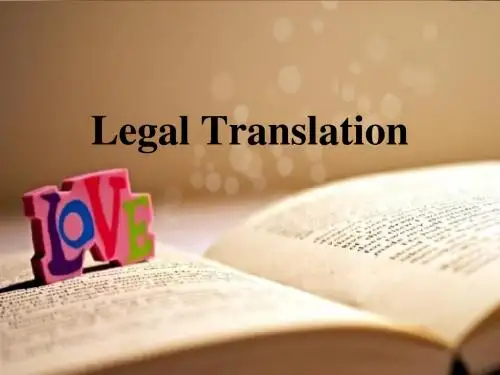
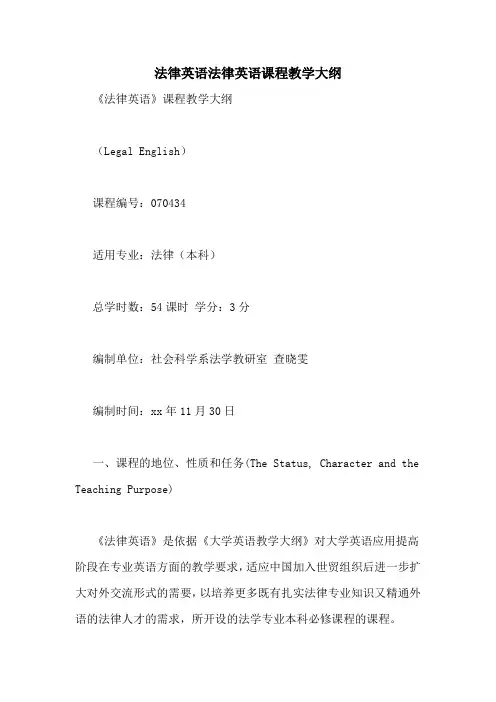
法律英语法律英语课程教学大纲《法律英语》课程教学大纲(Legal English)课程编号:070434适用专业:法律(本科)总学时数:54课时学分:3分编制单位:社会科学系法学教研室查晓雯编制时间:xx年11月30日一、课程的地位、性质和任务(The Status, Character and the Teaching Purpose)《法律英语》是依据《大学英语教学大纲》对大学英语应用提高阶段在专业英语方面的教学要求,适应中国加入世贸组织后进一步扩大对外交流形式的需要,以培养更多既有扎实法律专业知识又精通外语的法律人才的需求,所开设的法学专业本科必修课程的课程。
本课程以英美法为教学核心内容,包括英语法律术语、英美法系与大陆法系的比较、英美律师职业介绍、英美主要部门法、WTO 法律文件选读、国际经贸法律、法学研究技巧与资源的运用。
本课程历时一个学期,其教学目的旨在培养和提高学生在法律领域里应用英语的能力。
在教师的指导下,学生通过阅读一些精选的法律类英语文章掌握法学基本概念和基本理论以及专业术语。
在教学过程中着重于扩大学生的专业词汇量,提高学生的英语阅读理解水平。
同时,本课程采用个人发言和小组讨论等多种形式以增加学生的语言实践机会,使他们能将专业知识与英语知识很好地结合,最终具有较强的英语口头交流能力和翻译能力Aording to the Teaching Criteria of the College English, Legal English, as a required course for the law school students, is aimed at training much more law experts whom are familiar with the foreign legal system.The main content of this course is Anglo-American Law system, including thelegal terminology, the international business and trade law, the parison between the Anglo-American law system and the Continental law system, the introduction of legal profession, the legal departments of the Anglo-American, the supplementary reading material of WTO, and the techniques and sources for legal research (skills for presenting and legal writing).Legal English lasts one semester with its purpose of developing students’ ability to take use of English in the legal field. With help of the teachers, the students can suessfully master some basic legal terminology and theories, and in Law by reading some well-selected English legal essays. In process of teaching and learning, the emphasis is placed on enlarging students’ vocabulary in legal English and on raising their English reading prehensive levels. Meanwhile, the course adopts individual speeches or group discussions and other teaching methods in order to provide as more lingual practice as possible for students, helps them well-bine their knowledge both in major and English. At last, they can suessfully plete the course study paratively good English oral skills in munication and translation.二、本课程与其他专业课程的关系(本课程学习所必备的知识)(Necessary knowledge)学生要重视其他各法律核心和专业课程的学习, 掌握基本法律知识和概念,在学习的同时还要对英美法律制度认真研习。
评价法律专业的英语作文范文(中英文实用版)Title: Evaluation of Legal English Essay ExampleIntroduction:The legal profession plays a crucial role in maintaining justice and upholds the rule of law in any country.Legal English is a specialized language used by legal professionals to communicate effectively in their field.This essay aims to evaluate the importance of Legal English and its impact on the legal profession.Body:1.Importance of Legal English:Legal English is essential for legal professionals as it enables them to understand and interpret laws, statutes, and legal documents accurately.It provides a common language for legal practitioners to communicate and collaborate both domestically and internationally.Legal English also helps in the proper understanding and application of legal principles and precedents.munication and Legal Writing:Legal professionals need to possess excellent communication skills to draft legal documents, briefs, and opinions.Legal English ensures clarity, precision, and effectiveness in legal writing.It enables legal practitioners to convey complex legal concepts in a clear and concisemanner, avoiding any ambiguity or misinterpretation.3.Access to International Legal Resources:In today"s globalized world, legal professionals often deal with international legal issues and collaborate with colleagues from different jurisdictions.Legal English proficiency allows legal practitioners to access and understand international legal resources, such as treaties, conventions, and judicial decisions.This enables them to provide comprehensive and accurate legal advice to their clients in the global arena.4.Enhancing Legal Research and Analysis:Legal English plays a vital role in legal research and analysis.Legal professionals need to conduct extensive research to stay updated with the latest legal developments and cases.Proficiency in Legal English enables legal practitioners to access legal databases, research materials, and academic publications in English, which is the primary language used in legal scholarship and research.5.Advancing Legal Education and Training:Legal English is an essential component of legal education and w students and legal trainees need to develop a strong foundation in Legal English to comprehend legal texts, cases, and lectures.Proficiency in Legal English enhances the quality of legal education and training, preparing future legal professionals to excel intheir careers.Conclusion:In conclusion, Legal English is a critical skill for legal professionals.It facilitates effective communication, legal writing, access to international legal resources, legal research, and analysis, and enhances legal education and training.Proficiency in Legal English is essential for legal practitioners to excel in their careers and contribute to the administration of justice.Therefore, legal professionals should endeavor to develop strong language skills in Legal English to meet the demands of the legal profession in the globalized world.。
介绍法律英语翻译作文Legal English translation is the process of translating legal documents, texts, or content from one language to another while maintaining the accuracy and legal terminology of the original document. It requires a deep understanding of both the legal system and the languages involved in the translation process. Legal English translation is a specialized field that requires a high level of expertise and precision to ensure that the translated document is accurate and legally binding.One of the key challenges in legal English translation is the complexity and specificity of legal terminology. Legal documents are often filled with technical terms and jargon that may not have direct equivalents in other languages. Translators must have a thorough understanding of the legal systems of both the source and target languages to accurately convey the meaning of these terms. In addition, legal documents often have strict formatting and stylistic requirements that must be adhered to in thetranslation process.Another challenge in legal English translation is the need for precision and accuracy. Legal documents arelegally binding and any errors or inaccuracies in the translation could have serious consequences. Translators must pay close attention to detail and ensure that the translated document accurately reflects the intent and meaning of the original text. This requires not only linguistic skills but also a deep understanding of thelegal concepts and principles involved.In addition to linguistic and legal expertise, legal English translators must also have strong research skills. Legal documents often reference specific laws, regulations, and case law that may vary between different jurisdictions. Translators must be able to conduct thorough research to ensure that the translated document is consistent with the legal requirements of the target language. This may involve consulting legal dictionaries, databases, and other resources to verify the accuracy of the translation.Overall, legal English translation is a complex and challenging process that requires a high level of expertise and precision. Translators must have a deep understanding of both the legal systems and languages involved in the translation process to ensure that the translated document is accurate, legally binding, and meets the requirements of the target audience. By combining linguistic skills, legal knowledge, and research abilities, legal Englishtranslators play a crucial role in facilitating communication and understanding across different legal systems and languages.。
黑龙江大学外语教学研究部本科生毕业论文(设计)参考题目毕业论文题目在满足教学要求的前提下,可以多样化。
题目的难度和份量既耍参照普通高校同层次同专业的水平,又要体现出应用英语本科段学习的特点,鼓励学生理论联系实际,选择既有理论深度,又有实践价值的题目。
下列题目结合本校应用英语本科段课程设置特点,仅供参考。
一些题目仅提供研究方向,学生须自定具体题目。
I张晓军II高占荣III娄巍IV曹飞V侯桂杰VI蒋红VII宋月霜VIII张砺丹IX冯莉X崔常亮XI章洋XII王洪宝XIII苏光宇X IV周文萱XV王盈盈注:申报选择题目时,请附带题后的编号。
无编号的可不带。
International Trade Practice1.A Study on Soft Clauses in Letters of Credit(I)2.Legal Responsibilities of Parties to Documentary Credit(I)3.Analyzing Characteristics of L/C Business(I)4.On L/C Swindle and its Prevention(I)paring Documentary Collection and Letters of Credit(I)6.On Documentary Collection(I)7.Influence of Green Trade Barriers on Our Food Exporting8.Green Trade Barriers on Packaging9. A Study on the Latest Tax-refund Administration(I)10.On Protectionism against in China11.International Business Opportunities and Challenges by Ecommerce12.The Effects of the E-commerce on the International Trade13.The Dynamic Development of Special Letters of Credit(XV)14.Study on the Use of Non-tariff Barriers (XV)Intercultural Business Communication15.Cross-cultural Differences in Sensation and Perception(III)16.Attitudinal Problems as Barriers to InterculturalCommunication(III)17.Cultural Influence on Written Communication(III)18.Nonverbal Communication---- Time(III)19.Nonverbal Communication ---- Paralanguage(III)20.Verbal Communication Styles(III)21.Translation Problems as Language Barriers(III)22.Analysis on Different Tones in Business Writing23.Cultural Influences on Business Communication(X)24.Cultural Influence on Packaging in Different Countries25.Cultural Influence on Language Learning (On English)municating across Chinese and American Cultures27.Culture Influence on International Business Competitiveness28.浅析跨文化商务交际失败的原因(X)29.商务英语教学与跨文化商务交际能力的培养(X)30.非语言交际在跨文化商务交际中的功能及运用(X)31.跨文化商务交际中的语言因素(X)32.国际商务谈判中的跨文化非言语交际(X)33.文化差异与跨文化商务沟通(X)34.国际商务活动中的文化冲突现象分析(X)35.跨文化商务交际及其语用策略(X)36.中西方文化差异对跨文化商务交际的影响(X)37.语用失误看跨文化商务交际(X)38.商务英语中的跨文化交际因素(X)39.跨文化商务交际中的中美空间语言对比研究(X)40.试论中国企业如何从跨文化角度应对经济全球化(X)41.跨文化交际中的中美时间观之对比分析(X)Marketing42.Product Pricing Considerations and Strategies in Supermarkets43.Promotion Strategy in Market Developing (of a specific product)44.Marketing Strategy in the Introduction Stage(of a specificproduct)(VI)45.Marketing Strategy in the Growth Stage(of a specific product)(VI)46.Marketing Strategy in the Maturity Stage(of a specific product)(VI)47.Marketing Strategy in the Declining Stage(of a specific product)(VI)48.From Customer Satisfaction to Customer Loyalty49. A Study on Relationship Marketing50.Effects of Cultural Elements on Marketing Activities51.The Profound Impacts of Consumer Buying Behavior onMarketing Activities52.The Role of Packaging in Marketing53.Studies On Food Packaging54.Strategies on Cosmetic Marketing55.Building Powerful Terminals of Products56.On the Pros and Cons of Online Marketing57.Strategies on Personal Selling and Public Relations58.From CRM to Cross Selling59.On Pricing Strategies of Super-markets60.Experiential Marketing61.The Strategies of Creating Customer Satisfaction---(XIII)62.The Successful Practices of New-Product Development---(XIII)63.The Practice of Pricing Strategy in Marketing----(XIII)64.Research on Distribution Channels ---(XIII)petitive Promotion Strategy------(XIII)66.Social Responsibility and Marketing Ethics in FoodIndustry(XIII)67.The Marketing Environment of Small and Medium-sizedCompany(XIII)68.The Pricing Strategies of Small and Medium-sizedCompany(XIII)69.New High-tech Products Research and Development(XIII)70.Logistics Management in Marketing(XIII)71.Social Responsibilities and Marketing Ethics(XIII)72.Online Marketing (XIII)73.Research on Publics in Marketing(XIII)74.Pricing strategies of new products(VI)75.New marketing channels (supermarkets, network marketing,etc )(VI)76.Adverting strategies in a specific market (VI)77.Brand strategies (brand stretching, brand loyalty, etc)(VI)78.Promotional strategies in a specific market (special promotionaltools)(VI)79.Consumer psychology and behavior (VI)注:以上题目还可灵活微调和细化。
法律翻译英语Legal TranslationLegal translation involves the translation of documents and texts related to the legal field, such as contracts, court documents, laws, regulations, and legal correspondence. It requires a deep understanding of both the source and target languages, as well as a comprehensive knowledge of the legal systems of both countries.Legal translators are responsible for accurately translating complex legal concepts and terminology while ensuring that the intended meaning and legal implications are properly conveyed. They must be familiar with legal terminology and concepts specific to both common law and civil law systems, as well as different legal procedures and principles.One of the main challenges of legal translation is ensuring that the translated text adheres to the legal systems and requirements of the target country. Different countries may have different legal principles and legal concepts, which may not have an exact equivalent in the target language. Translators must carefully analyze and research these differences to ensure that the translated text is accurate and legally valid.Precision and accuracy are of utmost importance in legal translation, as even slight mistranslations or omissions can have significant legal consequences. A poorly translated legal document could lead to misunderstandings, disputes, or even legal invalidation.In addition to linguistic skills, legal translators must possess excellent research and analytical skills. They need to consult legal dictionaries, reference materials, and legal databases to ensure accurate and consistent translations. They must also be familiar with the specific legal terminology and language used in the different branches of law, such as contract law, criminal law, intellectual property law, and administrative law.Confidentiality is another critical aspect of legal translation. Legal documents often contain sensitive and private information, and translators are required to adhere to strict confidentiality agreements. They must handle the documents with the utmost professionalism and ensure that the information remains strictly confidential.In conclusion, legal translation is a specialized field that requires extensive knowledge of both legal systems and languages. It requires translators to accurately convey legal concepts and terminology, adhere to the legal systems of the target country, and maintain strict confidentiality. Legal translation plays a crucial role in facilitating communication and ensuring the accurate interpretation and application of legal documents across different jurisdictions.。
Research in the Translations of Legal EnglishPollyAbstractThis research paper summarizes the basic characteristics of legal English, some principles to obey and some skills to use when translating the legal English into Chinese. In addition ,I introduce some factors affecting the translation of legal English such as lexicon and culture background. Doing such research benefits my study both in law and English.Since I am a law-major student, this research is very helpful for improving my knowledge in law and translation.It is a worthy research to do for an ET-class student in the same way.Contents1.Introduction (4)2.Characteristics of Legal English..........................................................................................4-6Lexicon characteristics.....................................................................................................4-5 Syntactic Characteristics..................................................................................................5-6 Factors Affecting the Translations of Legal English...........................................................6-7 Lexicon factors.. (6)Culture Background Factors (7)Principles of Translations in legal English..........................................................................7-8 Solemnity. (7)Accuracy (8)5.Conclusion...........................................................................................................................8-9IntroductionTranslation is a comprehensively complicated procedure.It is cross-linguistic,cross-culture and cross-social.Meanwhile,translation procedure is not just a language transforming procedure.It is more about a culture transforming procedure.Legal English, as for its own literary style,it should be formal when used into profession career.Therefore, legal English is a specific and professional language as a variant in the whole English register. There are particular expressing ways and norms in legal English, because countries who use common law make them happen gradually by juridical practices. Consequently, legal English is quite different from common English, with forming its own special literary style. Due to the different histories and customs in different countries’ legal systems, although they have familiar juridical sources,their legal construction can not easily be familiar.Translation of legal English involves comparasion to different legal systems while trying best to make the translation match the original text.Translators have to master the characteristics and culture of legal English so that to better translation works.Characteristics of Legal EnglishLexicon characteristicsLexicon is the basis of language.According to Mellinkoff's Dictionary of American Legal Usage: “Lexicon of legal English is divided into six types including profession law terms, old English vocabulary, loanwords which the etymology is Latin and French words, common words with professional meaning,formal words and words in pairs”(Mellinkoff .6)Professional law terms, such as “Plaintiff,” “aforesaid,” and “Recidivism,” they are in typical literary style of legislative language, simply not exist in other register.Common words with professional meaning, we shall exclude the common meaning that are not related with the law in the common words. Only that way can we clearly reveal the specific law meaning of common words and avoid confounding common meaning with professional meaning. For instance, the word “society,” common meaning is that people in general, thought of as a large organized group. However, its legal meaning could be an insurance company.Loanwords are common to be seen in English and so is in legal English.Most of the professional law terms are originated from Latin words during the Middle English Period and the following Renaissance.So its normal to see great amount of loanwords in legal English.Syntactic CharacteristicsComplex of syntax is a great difficulty for tyro while dealing with the legal files.It is the complicated noun structures, frequent used passives and long sentence structures that make the complex show up.In the mean time,they are the main characteristics of syntax in legal English.In addition,difficulty is increased by Adverbial clause of the compound condition and the prepositional phrases used in high rates.Here,I will explain how to use the Adverbial clause of the compound condition in the translation of legal English.In legal English,sentences contain subject and predicate are more often to be used,which we call complete sentence.Do not use elliptical sentence and monotreme so that avoid various interpretation.As Crysta and Davy once pointed that"Legal sentences are usually self- contained units which convey all the sense that has to conveyed at any particular point and do not need to be linked closely either to what follows or to what has gone before ." ( Wong, Crysta. and Davy Ting.58)Translators should analyze from grammars and comprehend the whole meaning of the sentence at the beginning.First is the sentence structure then the relations between them.After all of this,you can finally use proper Chinese to translate them.Factors Affecting the Translations of Legal EnglishSince I have list the characteristics of translations in legal English above,it is necessary to know the factors affecting the translations of legal English before making the accurate translation. Lexicon factorsIn some formal legal texts lik e contracts,old words such as “whereof,”“wherein,” “whereby,” “herein,” “here inafter,” “herew ith,” “therefore,” “therefrom,” “thereon” are used in great amount to make the expression more clear. In sentences with those words, “where,” “there” or “here” can be considered as “which” and “that,” referring to the former or latter situations and objects.If we do not understand how to use these function words,it would be very hard for us to comprehend and translate.Loanwords especially Latin words and French words also affect the translation in a deep way.In America, students majoring in law need to finish and pass the Latin course among 1 to 2 years.We can see that loanword is so important in America’s law education.As a branch of the civil law system and the common law system, Roman law and the following French law had a profound influence on the success of the law in the whole world. Consequently, legal English draws lessons from Latin and its words. I am going to give an example,which I quote from an article.The word ,“res,” means “thing.” In the “decree in rem,” “rem” means “thing,” too and in “chose in possession,” “chose” is a French word and also means “thing”( Frederick G.13).So we can draw conclusion that being familiar to the Latin words and other loanwords benefits a lot to learning legal English,or it would bring a lot of difficulties to translation.Culture Background FactorsEnglish and Chinese are born in different language culture background. No matter the manner of writing style or diction, th ey are far more different. “English sentence has more clear logic so hypotaxis appears”(Wong 4). Using words repeatedly is not regular in English grammar. In English, we use pronoun and auxiliary verb for lexical equivalents.But in Chinese, we attach importance to parataxis. Because of the difference between two languages,and the accuracy demanded in legal language,it is hard to obey the two grammars at the same time,while translating. However, Translators could take advantage of various translating skills such as “Amplification ,” “Ellipsis,” “Positive and Negative ” (Zhang 8)Principles of Translations in legal EnglishLegal English is a kind of language with strong practicability.Basically, there are four main principles,including Solemnity, Accuracy, Refining Principle and Same Term Principle. Solemnity relates to rights and obligations.Party in real case owns its rights and obligations,it is so important to be serious about the words and sentence.That is the reason why legal English should be solemn.Accuracy is easy to be understand.Because Accuracy is regarded as the soul of translation, it is translators’ duty to make the translations specific and clear.Pay attention to the differences between Chinese logic and English logic, avoiding being affected by the thinking ways you have in your daily life.Translations always miss the accuracy by using wrong words.Refining Principles would be a challenge for translators.To refine the translation needs translators to be good at handling language.It means that translators are required to use small amount of words to translate and sum up great amount of information ,to be sample and abandon the complication.Same Term Principle exists for maintaining the conception, the connotation and stuffs to be matched at the same level in legal area. If we do not obey the principle, works might be left to various interpretations.To reach the demand of this principle,we can use same words for more times.Once we decide to use the word, we should keep to the last.ConclusionAfter analyzing the characteristics,factors and principles of the Translation of legal English,we can obviously understand that translation of legal English is more difficult and complicated than in other areas.When we translate, we need to pay attention to the history ,thinking ways and other aspects in English and Chinese.That requires us to accumulate words no matter loanwords or professional terms in English and Chinese.In addition,it’s better to strengthen our own mother language and some relative legal culture,improving our level to a new stage.All I have stated in this research are relative to culture difference.As we know, learning a language is learning a new culture and a new logic.I prefer to master the characteristics of the culture in two different language rather than just memorize the specific words and terms to improve my level.Only by mastering the characteristic of culture can we choose an accurate direction when we translate.As for me, a law- major student, I have to be more professional in legal knowledge so that to get rid of barriers which seems to be unprofessional.One more point, language is lively and legal language is not the exception.It is changing all the time.Updating the professional knowledge and skills is far more promising for a translator.Works CitedMellinkoff, David. The language of the law [M]. Boston:Little Brown, 1963: 6.Wong, Crysta. and Davy Ting .Introduction to English Stylistics, China:Foreign Language Teaching and Research Press,2001:58Frederick G. Kempt. Historical Introduction to Anglo-American Law.Beijing: Law Press China, 2001:13Wong, Boran.To See the Linguistic Differences Between Chinese and English from Cultural Differences.Beijing: Dongbei University Press,2000:4Zhang ,Peiji. Yungen Yu. Zongjie Li. and Moyu Peng. A Course in English-Chinese Translation.Beijing:1980:8。